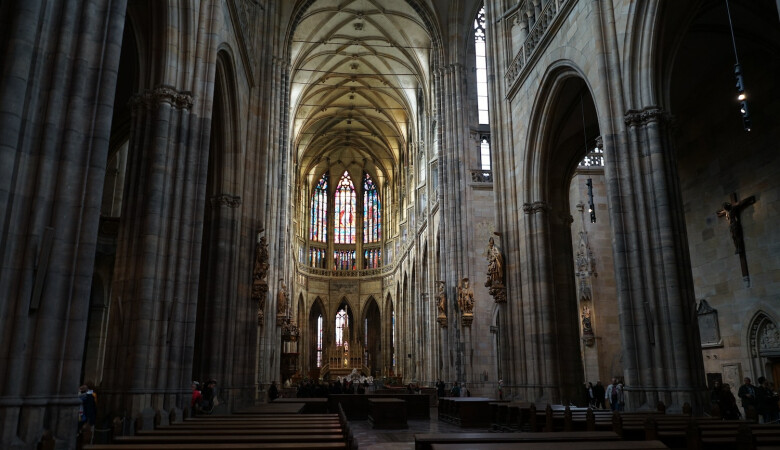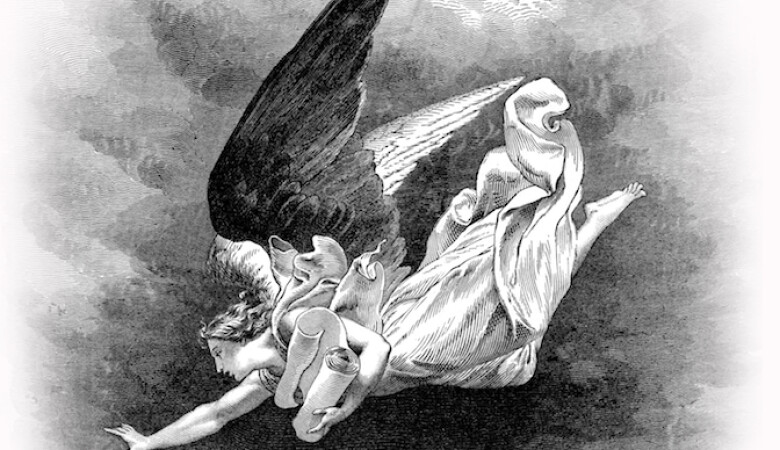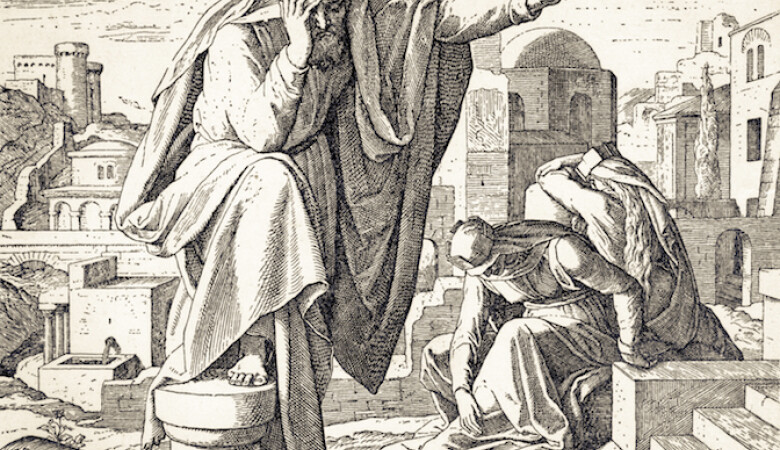A Mighty Angel and a Little Scroll (Revelation Sermon 17 of 49)
August 20, 2017 | Andy Davis
Revelation 10:1-11
Angels, The Word of God
Introduction
Turn in your Bibles to Revelation 10 to continue our study in the book of Revelation. The word revelation means unveiling; it pulls the veil back between the physical and spiritual world as no other book of the Bible does. As we peer into the invisible spiritual world, we see more than we could have conceived with our unaided imaginations. Certainly the most significant invisible reality we see by the book of Revelation is the glory of the triune God — the Father, the Son, and the Holy Spirit. God the Father seated on a throne of eternal glory. God the Son, Jesus Christ, pictured as a lion and as a lamb, or as a high priest walking among seven golden lamp stands. God the Spirit pictured as a seven-fold light blazing, shining, a lamp stand with the fire of holiness. No book in the Bible so powerfully reveals the hidden nature of the triune God as does Revelation. But that is not all the book of Revelation unveils about the invisible spiritual realms. For there are awesome created beings that we would never know about, what they are like, if it were not for this book. That includes beings we commonly call angels.
Today we will encounter through the text an angel that I believe still lives and is every bit as glorious and powerful now as he was 2000 years ago, who encountered the Apostle John to give him a commission. This encounter will give us a broader sense of the universe in which we really live, invisible realms that we did not know were around us at every moment. It will give us a better ability to live for the glory of God in this physical world.
Let us set the context. The Apostle John was the human instrument for the book of Revelation. He was in exile on the island of Patmos for the testimony of Jesus. Patmos is a tiny, rocky, deserted island off the coast of modern day Turkey. On that barren island, Jesus Christ communicated a revelation of himself to John. John heard the voice of Christ, and he saw a door standing open in the heavenly realms. Christ called on him to ascend from earth to go through that doorway into the heavenly realms.
He was empowered by the Spirit to do that, and he was promised that he would be told things about the future. “I will show you what must take place after this.” [Revelation 4:1] As he went through the doorway, the first thing he saw was a throne in heaven with someone seated on it. That throne, the throne of Almighty God, is the central and most important reality of the universe; it shows the glory of God, who is seated there. He is celebrated there in Revelation 4 as the glorious Creator of the universe, all things visible and invisible. He is worshiped there by twenty-four elders seated on their thrones, and by four living creatures, and by 100 million angels. Revelation 4 celebrates God the Creator.
In God’s right hand, as he sits on this throne, is a scroll sealed with seven seals. A mighty angel calls out, “Who is worthy to break the seals and open the scroll?” [Revelation 5:2] No one is found worthy until Jesus Christ appears. He is portrayed as the Lion of the tribe of Judah and also as a lamb looking as if it had been slain. He takes the scroll from the right hand of him who sits on the throne. When he does so, cascading worship erupts in heaven for Christ the Redeemer, who by his blood purchased people for God from every tribe, language, people, and nation.
In Revelation 6 he breaks open the seals one at a time. As he does, judgments come on the earth. The Four Horsemen of the Apocalypse ride on the surface of the earth bringing judgments and suffering. Martyrs, people who have been slaughtered for the testimony of Christ, cry out for justice and vengeance. The sixth seal brings the end of the physical universe as we know it — the sun, moon, and stars falling, and every mountain and island removed from its place.
When the sixth seal is opened, the inhabitants of the earth flee from the wrath of God, looking for a refuge. They cry to the mountains and to the hills, “Fall on us and hide us from the face of him who sits on the throne and from the wrath of the Lamb! For the great day of their wrath has come, and who can withstand it?” [Revelation 6:16-17] It is an incredible question, and something that we need to heed now. Where will there be a refuge from the wrath of God?
Revelation 7 seems to answer that question. The refuge is Christ. Those who flee to Christ, including 12,000 who are sealed from each of the 12 tribes of Israel, and a multitude greater than anyone could count from every tribe, language, people, and nation, seem to be the answer to the question “Who shall be able to stand?” We who are sinners will be redeemed and saved by the shed blood of Christ. We will stand fully forgiven in white robes celebrating the salvation that God alone can give.
The Lamb breaks open the seventh seal as Revelation 8 begins, which seems to contain seven trumpets judgments. They start to flow, bringing a level of suffering and judgment on earth such as we can scarcely imagine. The first four trumpets in Revelation 8 are terrifying judgments on the ecology of the earth: on the green vegetation, burning up all the green grass, a third of the trees, and a third of the earth; on the oceans, turning a third of them into blood and killing a third of all the aquatic creatures in the ocean; on a the fresh water, turning a third to poison so that people cannot drink it; and on the sun and the moon and the stars, reducing their light by a third.
In Revelation 9, the fifth and sixth trumpets unleash a demonic horde, which billows from the nether regions, coming up out of a shaft from deep in the earth. It is a demonic assault on the human race likened to a plague of locusts and the attack of scorpions. People are in agony for five months, crying out for death, which will elude them. This is followed by an invasion of a demonic army, either of humans incited by demons, or actual demons, 200 million strong, bringing death to one-third of earth’s population.
We come in Revelation 10 to a dramatic pause in the action before the seventh trumpet sounds, similar to the pause in Revelation 7 between the sixth and seventh seal. A respite is needed; the judgments are overwhelming in Revelation 8 and 9. John has a vision of a mighty angel with a little scroll. He comes to recommission John to speak future words of sweetness and bitterness that we desperately need to hear and eat; the angel’s message connects, with the two witnesses in Revelation 11, as we will see. Revelation 10 contains the timeless witness of the Word of God from the angel through John, as he testifies by writing it down. Then the two witnesses provide a temporal verification in space and time, proclaiming the truth of God. That is the combination of truth flowing from God, through Scripture and through verbal human witness to the generations that need to hear it.
The Mighty Angel Described
What are Angels?
We begin looking now at Revelation 10:1-4 with a description of this mighty angel. Before we do that, let’s say a few words about angels. What is an angel? The word “angel” is a transliteration of the Greek word “angelos,” which is a messenger; here meaning someone who comes with a message from God. But they do more than deliver messages. Angels are created spiritual beings, different from human beings in that they have no body, no physical existence. They have no birth, do not age, and do not die. They have no flesh and blood; they are spirits. There are good angels who serve God and wicked angels called demons who serve their king, Satan. Angels are active throughout the Old Testament, but their activity is greatly enhanced and focused on in the New Testament, even clearer and more dramatic.
For example, angels were present at the birth of Christ in Bethlehem. The shepherds were outside the city of Bethlehem, watching their sheep at night, and an angel of the Lord appeared. The glory of the Lord shone around, and the shepherds were terrified. The angel brought the message to the shepherds of the birth of Jesus Christ, the Savior of the world. “Today in the town of David a Savior has been born to you; he is the Messiah, the Lord.” [Luke 2:11] Then suddenly, with the angel, a huge army of angels appears, praising God, glorifying him, and saying, “Glory to God in the highest heaven, and on earth peace to those on whom God's favor rests.” [Luke 2:14]
Angels were there at the beginning of Christ’s earthly life, and then they were there at the end. The angels came down to the tomb where Jesus had been buried. The appearance of one was overwhelming, like lightning with clothes as white as light. When the Roman guards at Jesus’ tomb saw him, they were so terrified of him that they shook and became like dead men. The angel rolls back the mighty boulder from the mouth of the tomb and sits on it. He says to the women that are there to finish the burial rites of Jesus, “Why do you look for the living among the dead? He is not here, He has risen!” [Luke 24:5]
Angels are there at the beginning and the end of Christ’s life, and even as Jesus ascends to heaven. His apostles watching him ascend higher and higher into the clouds. God dispatches an angel to send them back to Jerusalem to wait for the outpouring of the Holy Spirit. “This same Jesus, who has been taken from you into heaven, will come back in the same way you have seen him go into heaven.” [Acts 1:11] So we see angels throughout the New Testament, in the book of Acts as well as other places. Hebrews 1:14 says, “Are not all angels ministering spirits sent to serve those who will inherit salvation?” They serve us in many invisible ways that we cannot understand.
Benefits of Studying Angels in Scripture
What are the benefits of studying angels in Scripture? I am a verse-by-verse expositor. The main idea from a text is the main point of my sermons. Angels are hardly ever the main point of any sermon text except today. We have the opportunity to zero in on angels to understand them.
Why we should study them? First, we should know how protected we are by angelic warriors, that angels fight and do other things for us in ways we do not see and can hardly imagine. We need to be aware of that. Second, it helps us to know more of the complexity of the true universe, both the spiritual and the physical in which we live. These beings were created by God because he wanted them to exist, and they glorify God in marvelous ways. We should be joyful about that.
Third, we study angels so that we can imitate their obedience to God. It says in the Lord’s prayer, Matthew 6:9-10 “Our Father in heaven, hallowed be your name, your kingdom come, your will be done on earth as it is in heaven.” Who does God’s will in heaven but the angels? For us to study their prompt obedience and their eagerness and zeal to obey everything that God tells them to do, their willingness to serve in every way, they are role models for us in serving God.
Danger of Focusing on Angels
However, there are dangers in studying angels as well. We human beings are constantly drawn after created beings in an idolatrous manner. I believe every false religion and every cult in the world has had evil angels behind them, supernatural forces that have set up those false religions. It is dangerous to focus too much on angels and supernatural beings.
I am fascinated by artistic renditions of angels, like the fat little baby in a diaper with bow and arrow, or in current popular culture, beautiful women with long hair. Your angel ornaments, even from Christian suppliers, probably look like that. But angels in the Bible, if they are given any of human form, are pictured as young men and warrior types, like in our chapter today. It is best not to use our imaginations to draw artistic renditions of what angels look like. If that causes you to rethink some of your ornaments, that is between you and God.
Angels are supernatural beings that are often depicted as surrounded with awesome displays of supernatural light; therefore people are tempted to worship them. Even the Apostle John is tempted twice at the end of the book of Revelation to fall down and worship an angel that was interacting with him. Revelation 19:10 “At this I fell at his feet to worship him. But he said to me, ‘Do not do it! I am a fellow servant with you and with your brothers who hold to the testimony of Jesus. Worship God!’”
Paul specifically warns against the worship of angels in Colossians 2:18. Satan and his demons take advantage of this human tendency to worship angels; he is said in 2 Corinthians 11:14 to “masquerade as an angel of light.” Much of the new age mysticism probably stems from spiritual experiences such as supernatural encounters with fallen angels, or demons. People can focus too much on angels and forget they are only created beings, servants like us as, the angel tells John. To spend a huge amount of time thinking about angels is misplaced focus.
How Are Angels Especially Active in Revelation?
How are angels especially active in the book of Revelation? 73 of the 188 references to angels in the New Testament are in the book of Revelation. They are extremely active in this book. Since Revelation is all about the unveiling of the invisible spiritual realms of the future, it is not surprising that angels figure so prominently. Angels are depicted around the throne of God; their home base is there, worshiping God. They delight in the worship of God.
But they are also active in unleashing wrath on planet earth. One angel in Revelation 8 takes live coals from the altar of God, puts it in a golden censer, and hurls it on the earth. In Revelation 8 and 9, angels sound the seven trumpets, bringing the terrifying judgements on earth. In Revelation 12, we will see the battle between good angels and evil angels in the heavenly realms, and the ultimate king of the evil angels, Satan. Revelation 16 shows the angels pouring out the bowls of God’s wrath on the earth, and celebrating the justice of God in, for example, turning water into blood because of the shed blood of God’s servants. God has given them blood to drink as they deserve. “You are right for doing this.” They delight in this display of God’s justice. So they are actively involved in the unfolding events of the book of Revelation.
Perhaps the most important role of these heavenly messengers is to bring the Word of God from God to prophets and apostles to communicate to us. Angels are active mediators of that message frequently. In Revelation 1:1 it says, “The revelation of Jesus Christ, which God gave him to show his servants what must soon take place. He made it known by sending his angel to his servant John.” The angel was in between Jesus and John, delivering the book of Revelation. We learn in the New Testament that the entire law of Moses was mediated through angels.
Angels often carry messages from God to the prophets. Probably the clearest parallel to Revelation 10 is Daniel chapter 10. Daniel seeks insight and wisdom from God about the future of the Jewish nation. He is praying and fasting and seeking God. God dispatches an angel to bring him the answer. Daniel 10:5-8 says, “I looked up and there before me was a man dressed in linen, with a belt of the finest gold around his waist. His body was like chrysolite, his face like lightning, his eyes like flaming torches, his arms and legs like the gleam of burnished bronze, and his voice like the sound of a multitude [an awesome display of an angel]. I, Daniel, was the only one who saw the vision; the men with me did not see it, but such terror overwhelmed them that they fled and hid themselves. So I was left alone, gazing at this great vision; I had no strength left, my face turned deathly pale and I was helpless.”
This angel in Daniel 10 was dispatched by God to answer Daniel’s prayer for wisdom about the future. He says in Daniel 10:14, “Now I have come to explain to you what will happen to your people in the future, for the vision concerns a time yet to come.” The angel’s job was to bring an answer to the prophet about the future. The angel in Daniel 10 had the same function that this angel has in Revelation 10, to bring God’s word to a man, a prophet, to proclaim it to the whole world.
The angel’s appearance in Daniel 10 was so overpowering that Daniel was knocked to the ground. In Daniel 10:16-17, “I said to the one standing before me, ‘I am overcome with anguish because of the vision, my lord, and I am helpless. How can I, your servant, talk with you, my lord? My strength is gone and I can hardly breathe.’” He was so overwhelmed by the presence of this glorious being that he could not breathe — he was on the ground. This should give us some sense of the overpowering strength and might of the angels of God; so also this one in Revelation 10.
How is this Angel Described?
Look how he is described in chapter 10:1-3: “Then I saw another mighty angel coming down from heaven. He was robed in a cloud, with a rainbow above his head; his face was like the sun, and his legs were like fiery pillars. He was holding a little scroll, which lay open in his hand. He planted his right foot on the sea and his left foot on the land, and he gave a loud shout like the roar of a lion.” Here is another mighty angel, like some of the other angels John has already seen in his vision. John describes him as mighty, a sense that he is a warrior, powerful, ready to fight, strong, able to do anything God commands.
He is depicted as coming down from heaven to earth — meaning John is to be back on earth in his vision after having ascended through the doorway, signaling a reset — to bring a message to John. He is robed in a cloud. Often in the Bible clouds represent judgment from God. In Psalm 18, God is depicted as coming with the clouds of heaven, with wrath coming out of the clouds. Often in Scripture gathering clouds represent the unleashing of a storm of God’s wrath.
Yet there is also a rainbow above the head of the angel, which hearkens back to Noah’s flood, with the rainbow as a sign of God’s covenant never again to destroy the world by a flood. We think of the words “In wrath remember mercy.” [Habakkuk 3:2] With all of this display of wrath, there is still the sign of God’s mercy. His face is like the sun, shining with radiance of God, like the angel the night that Jesus was born in Bethlehem in a brilliant heavenly light.
His legs are like fiery pillars, like the pillar of fire or the pillar of cloud that led the Israelites, especially at night. That pillar of fire kept the Egyptian army with all of its power and chariots away from the people of God and protected them, and then led them through the dark path, through the Red Sea. It is a picture of death and then resurrection on the other side when the sun came up. They moved down across the Red Sea then back up and out, a picture of death and resurrection. The fiery pillar gave the light that they need to make it through the Red Sea. These pillars of fire are the angel’s legs.
The Little Scroll
He is holding a little scroll which lay open in his hand. The scroll is the point and focus of this whole vision, the reason for the angel coming from heaven to earth. It is called “little” based on the Greek word for scroll with a slight grammatical twist. Perhaps it looks little compared to the massive size of the angel, but of the two, the scroll will have a bigger impact on redemptive history than the mighty angel. That is the power of the Word of God. It is like comparing a tiny little acorn to a vast forest of oak trees that would come from that acorn: though it looks small initially, it will have a massive impact.
It lay open in the angel’s hand. Some have concluded that this might be the scroll that was sealed with seven seals, but I do not know that we can certainly connect the two. On it is writing from God; it lays open so that John can read it. This shows God’s willingness to reveal things to us. He has some things to show us, to tell us. Daniel was told to seal several of his visions for the future. Their meanings would be hidden until the right time. Now, this is a very important idea. The book of Revelation is written in difficult language; it is hard to interpret and there are many different ways to interpret it. God intended it that way. He could have written more clearly if he chose to. He intended to write a message that would be immediately relevant for 20 centuries of church history but with particular details relevant only for the final generation. It is amazing how he does both. Every generation, not knowing whether they are the final generation, can read it, but there are yet future things, details that have yet to be revealed. We will see that here in this chapter. The scroll lying open is that which God is willing to reveal to us right now.
Daniel was told, for example, in Daniel 12:4, “But you, Daniel, roll up and seal the words of the scroll until the time of the end.” Daniel did not understand the meaning, but he was told it was not for him but for a distant generation. In this open scroll before John lies the revelation of mysteries that God is intending to grant now to his people. But there are future insights that will come only at the end of the world. Verse 7 says, “But in the days when the seventh angel is about to sound his trumpet, the mystery of God will be accomplished, just as he announced to his servants the prophets.” In those days, God will reveal more. How? Not through a 67th book of the Bible but by current events that line up with the language of Scripture. It will not be clear to us unless we are in that final generation living through it. When you see the abomination of desolation spoken of by the prophet Daniel then you should do this. When you see this current event happen, you will know that Daniel has been fulfilled, and you should run for your life. Of this sequence, God is revealing some things to us now and some things only then.
The angel takes a mighty stance on the surface of the earth in verses 2-3, “He planted his right foot on the sea and his left foot on the land, and he gave a loud shout like the roar of a lion.” The stance is one of a mighty warrior. He cannot be moved from his position, as though taking his stand on the battlefield. He plants one foot on the dry land and one foot into the sea. John actually tells us that his right foot is on the sea and his left foot is on the land. Why does he designate that? I have no idea. I always invite people to give me their opinion but that is all it will be, opinion. Regardless of why we are given that information, this stance gives a sense of the awesome power of the angel.
Even more, though, the message he brings encompasses every realm that God made. It will affect all the creatures in the heavens, for the angel’s head reaches up to the clouds and his face is like the sun. It will affect the earth because his left foot is there. It will affect the sea because his right foot is there, with the word of God lying open in his hand, small though it may seem, will have a huge impact on all those realms. It says in Psalm 33:6, “By the word of the LORD were the heavens made, their starry host by the breath of his mouth” and as Jesus said in Matthew 24:35, “Heaven and earth will pass away, but my words will never pass away.” The angel’s voice is likened to the roar of a lion. Often when God brings his message, like at Mount Sinai, he gives overwhelming radiant light and terrifying sound so that we take the message of God seriously.
The Seven Thunders and the Limited Revelation
In verses 3-4, we have the seven thunders: “…he gave a loud shout like the roar of a lion. When he shouted, the voices of the seven thunders spoke. And when the seven thunders spoke, I was about to write; but I heard a voice from heaven say, ‘Seal up what the seven thunders have said and do not write it down.’” We do not know what the seven thunders are, nor do we know what they said. Obviously, they spoke intelligible words that John understood and could have written down or he would not need to be forbidden from writing them down. There is real information from the seven thunders.
But the words are sealed up. He is not allowed to reveal these things that we could know but God does not want us to know yet. Why? Perhaps knowing them would affect the flow of events in ways God does not choose. For example, Jacob thought his son Joseph was ripped to shreds by wild animals because his brothers who had sold him into slavery brought back his colored robe with blood on it. For many years, Jacob was under the misunderstanding that his firstborn son from Rachel was dead, but he was not. God could have revealed to him that his son was alive and flourishing as second-in-command in Egypt, but Jacob would have gone early, perhaps before he got to that position, to buy him out of slavery from Potiphar. He did not know until God was ready to reveal that his son Joseph was alive in Egypt. There are some things that are not for us to know now, though they are knowable.
So he has forbidden John from writing down what the thunders say. Deuteronomy 29:29, it says, “The secret things belong to the LORD our God, but the things revealed belong to us and to our children forever.” In our text, the division is that the secret hidden things are the seven thunders and the things revealed are the open scroll. God divides future things into what we definitely know is coming and what we do not yet know.
What Do These Symbols Mean?
To sum up, the angel is awesome, glorious, mighty and massive. He comes to bring an open scroll revealing secrets and mysteries through John to planet earth. Every nation and language and king will hear about these things concerning the end of the world which he will finally reveal, first through the rest of the book of Revelation to us and then second through the unfolding events of history in the future.
The Message from the Angel
The Solemn Oath
What is the message from the angel? The angel takes an oath stance to some degree and gives a solemn oath. Verses 5-6 say, “Then the angel I had seen standing on the sea and on the land raised his right hand to heaven. And he swore by him who lives for ever and ever, who created the heavens and all that is in them, the earth and all that is in it, and the sea and all that is in it, and said, ‘There will be no more delay!’” The angel takes this oath stance with his right foot left foot, as we've noted, and he raises his right hand up to heaven and takes an oath. The taking of the oath, we are told in the book of Hebrews, is to give us a sense of certainty about what he's talking about.
He swears by the eternal God, the God who lives forever and ever, whose kingdom never changes. He swears by the creator God, the King of all creation, the text looks at all the spheres of creation, of heaven and earth and sea and extends to all the creatures that go in those spheres, it extends to everything. The God who made the heavens and the earth and the sea, the eternal King by that God, I swear.
The Main Message
What does he swear? “There will be no more delay!” The unfolding of God’s plan seems to take forever. When will this happen? We always want to know. When, when, when? Maybe it will start tomorrow with the eclipse. (Be careful; do not burn your eyes, read safety tips about it. Your sunglasses are not enough. I looked through the polarized strip on my windshield with sunglasses on to do a trial run on the sun yesterday. Tomorrow the sun will be really interesting and dangerous. Watching a video might be safer.) We are always asking how long. When will all these things come about? In Daniel 12, an angel actually asked it. “One of them said to the man clothed in linen, who was above the waters of the river, ‘How long will it be before these astonishing things are fulfilled?’” The martyrs under the altar ask, “How long until we're avenged? How long, O Lord?”
But there will come a time in human history when things will rapidly come to an end. In the book of Revelation we are between the 6th and 7th trumpets. Think of what has already happened to planet earth — the ecology is damaged, the demonic armies have brought suffering and torture, killing a third of humanity. When those terrifying things happen, the time is very short; there will be no more delay.
The Significance of this Promise
Jesus said it will be so terrible in those days that “If those days had not been cut short, no one would survive, but for the sake of the elect those days will be shortened.” [Matthew 24:22] I would add that, for the sake of the elect, those days are numbered, and the number has been revealed to us. We will get to that in future, so that adds suspense. I will talk about the 1260 days in a few weeks. God has numbered those days why? Because it will be so horrible to go through that time that the saints will need to know how many days to expect. We who are not living through them now do not need to know to that level. But when these things happen, there will be no more delay.
The Mystery of God Accomplished
Verse 7 clearly identifies the timing: “But in the days when the seventh angel is about to sound his trumpet, the mystery of God will be accomplished, just as he announced to his servants the prophets.” The mystery of God means those things that are part of God’s overall redemptive plan down to some detailed levels that have not yet been told to us. The mystery of God will be accomplished in those days. One example of a mystery passage is Ephesians 1:9-10, which says, “And he made known to us the mystery of his will according to his good pleasure, which he purposed in Christ, to be put into effect when the times will have reached their fulfillment— [that is the end of the world] to bring all things in heaven and on earth together under one head, even Christ.”
That is the mystery, the big picture. He will destroy all evil or convert it and bring together into one head everything he has made to create harmony together under Christ, so that we are all worshiping, giving glory to God. The problems in our country and our city will be gone; we will be perfectly one. The time for the mystery to be accomplished will be short when the seventh trumpet sounds.
The book of Revelation represents the final stage of prophetic unfolding of the mysterious plan of God in writing ahead of time. In the days of the seventh trumpet, the end of all the messages ever given through the Old Testament, New Testament, prophets and the apostles will be accomplished, fulfilled, and the day of the Lord will have come at last. To that end, the angel has come to re-commission the Apostle John to finish his writing, the rest of the book of Revelation.
The Mission of the Angel
The Command to John, His Request, and Eating the Scroll
Verse 8 says, “Then the voice that I had heard from heaven spoke to me once more: ‘Go, take the scroll that lies open in the hand of the angel who is standing on the sea and on the land.’” The reason the mighty angel came down to visit John was to give him the scroll so he could proclaim its message to the nations of the earth. While Daniel was absolutely overwhelmed by the vision of the angel, John does not seem to be laid out in the same way. He is able to function, but he has to be commanded to get the scroll.
Verse 9 says, “So I went to the angel and asked him to give me the little scroll.” But the angel told him something about the scroll and the effect it would have not only on him, but also on every faithful believer who reads the book of Revelation, the things God commanded John to write.
Continuing in verses 9-10: “He said to me, ‘Take it and eat it. It will turn your stomach sour, but in your mouth it will be as sweet as honey.’ I took the little scroll from the angel’s hand and ate it. It tasted as sweet as honey in my mouth, but when I had eaten it, my stomach turned sour.” The angel told John to eat the scroll. As I read through this with my children, we pondered whether he literally chews and swallows it. I do not know, but it is at least a visionary language. As he eats it, it tastes sweet in his mouth.
Eating God’s Word or prophecy is well known and happens a number of times in the Old Testament. It is clear in Ezekiel 3:1-4, “And he said to me, ‘Son of man, eat what is before you, eat this scroll; then go and speak to the house of Israel.’ So I opened my mouth, and he gave me the scroll to eat. Then he said to me, ‘Son of man, eat this scroll I am giving you and fill your stomach with it.’ So I ate it, and it tasted as sweet as honey in my mouth. He then said to me: ‘Son of man, go now to the house of Israel and speak my words to them.’” Ezekiel was told to go only to the Jews but that they would not listen to him, though if he went to the rest of the world, they would listen.
Eating the scroll represents the total absorption of the Word of God into your inner being. Chewing, swallowing, digesting. It comes inside and fills you. John is to take this message in his mouth, chew it up, taste it, digest it and proclaim it.
The sweetness of the Word of God is established in so many places. Psalm 19 says that God’s Word, his Law, is sweeter than honey from the comb. It is a beautiful picture. But John’s experience would be a mixed one — sweet in the mouth, but bitter afterward, as though it gave him a stomach ache and he wanted to vomit. This represents that the message of the book of Revelation is a mixed one for us. It is difficult to hear.
The bitterness is related to the fact that many people will die under the wrath of God, not as believers in Christ, and that this beautiful world that God made will be completely destroyed as by fire. Moreover, the process of going through that will be grievous. It will be difficult to watch; people will die unrepentant under the wrath of God.
There is a sweetness that comes from knowing that God’s ultimate purpose is good, and that in the end, Revelation 21-22, there will be a radiant church and a new world and a glorious experience with God. That is very sweet. But now we have some bitterness to go through, not different than Jesus weeping over Jerusalem or the Apostle Paul having “great sorrow and unceasing anguish in my heart” [Romans 9:2] for the Jews who do not believe in Jesus. It is bitter and sweet.
John Recommissioned
John is then recommissioned to preach to the nations in verse 11: “Then I was told, ‘You must prophesy again about many peoples, nations, languages and kings.’” Eating the scroll results in John writing a prophetic message that the entire world must hear. He must prophesy; it is absolutely necessary that he write the message for the world. John is called by God and he has no choice. It is unclear in the Greek whether he is to prophesy about many nations, in the ESV, against many nations, or before many nations, in the KJV. I think it is all three. He will preach about, in front of and against nations.
John gives a common description of the nations such as “peoples, nations and languages,” but has here added “kings.” People from all over the world need to hear John’s message, but especially kings. Later in the book of Revelation, the kings of the earth will organize their power and regimes under Antichrist and gather at the battle of Armageddon to fight against the people of God, triggering the Second Coming of Christ, which we will cover in Revelation 17, God willing. The kings of the earth need to hear this. But before those days come, there will be some kings who will hear and heed the message of the Word of God and repent.
Isaiah 40:23-24 “He brings princes to naught and reduces the rulers of this world to nothing. No sooner are they planted, no sooner are they sown, no sooner do they take root in the ground, than he blows on them and they wither, and a whirlwind sweeps them away like chaff.” But some kings, some rulers, some movers and shakers, even in our day, will hear the gospel and repent and believe. As it says in Isaiah 52:15 “…so will he sprinkle many nations, and kings will shut their mouths because of him. For what they were not told, they will see, and what they have not heard, they will understand.”
Applications
What applications can we take from this incredible chapter?
An Interlude
This chapter is awesome even as an interlude, a break, from the overwhelming action in Revelation 8 and 9. We need to step back as we read through the book. We have seen the destruction in Revelation 8 of planet earth at levels we can scarcely imagine; and we have seen the destruction of the human race, up to one-third of the population of the earth, at levels that have never happened before in human history. These terrors are so overwhelming that we, the readers, need an interlude to catch our breath. But the vision is not merely a throw away or an intermission. God is saying, “I have more to say to you and you need to listen to the rest. It will be sweet, ultimately, for you, but there are some bitter aspects.”
It also shows the grace of God in unrolling the scroll of time in his own way, at his own pace. When we finish, you will walk out and the world will look like it always does. You will see the sun shining and feel the breeze on your face. You will see birds flying and the green grass. You will feel the heat of an August Sunday afternoon. And you will be tempted to think, “Where is all this that we have been reading about in the Revelation? Everything goes on as it always has.”
Whether you think that or not, I guarantee you, non-Christians are definitely thinking those thoughts. If they knew anything about these things, they would reject them out of hand, and think they are ridiculous. We need to read the words of the unsealed scroll, the Word of God, about the future that is coming. We need to take it to heart. We need to eat it and bring it into ourselves and say, “I believe that everything I see with my eyes is temporary and will some day be destroyed by the wrath of God. That needs to affect the way I live.” 2 Peter 3:11-12 gives us two great applications for this kind of meditation. “Since everything will be destroyed in this way, what kind of people ought you to be? [First] You ought to live holy and godly lives as you [second] look forward to the day of God and speed its coming…” by the proclamation of the Gospel.
Bear in mind that our Lord’s patience means salvation. “He is patient with you, not wanting anyone to perish, but everyone to come to repentance.” [2 Peter 3:9] We are entrusted with the ministry of reconciliation. Though racism is a weighty topic, this is a far bigger issue. It has to do with the eternal judgment of people on Judgment Day, in which the outcome will be eternal Heaven or hell. We are responsible to be holy ourselves and to preach the Gospel.
Parents: Teach Your Children These Things
I would urge you, parents, walk through this with your kids. Teach them eschatology, end-time doctrine. Teach them about angels. Teach them about what God says is coming so that they can be aware and live accordingly.
Understand Angels... Awesome Warriors!!
Understand angels. Understand how much they fight to protect us. Do not worship them, but be grateful for them, for the ministry that they carry on. Imitate their obedience so that God’s will would be carried out in your life as it is by the angels in heaven.
The Word of God... a Tiny Scroll that Will Outlast the Kings of the Earth
Finally, absorb the Word of God. Take it in, eat it, swallow it, let it affect the way you live your life.
Closing Prayer
Close with me in prayer. Lord, we thank You for the Word of God. We thank you for the way it teaches us so many things. And, Father, we pray that You would strengthen each one of us to welcome its message, to absorb it into ourselves and to heed it. Oh God, give us courage for the facing of this hour. Help us to be willing to stand strong against evil, against darkness, and to speak the truth, but to do it in love, hopeful that those that are holding destructive wrong views might be rescued and brought over into the Kingdom of Light. We pray this in Jesus’ name. Amen.






























